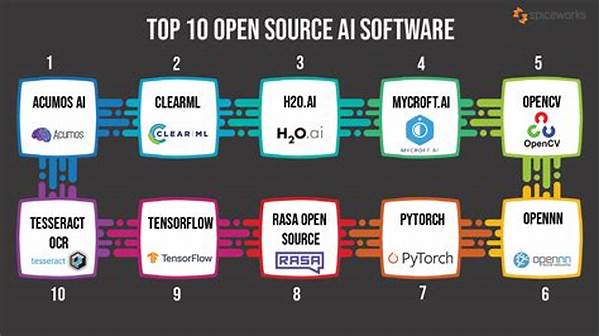In recent years, the realm of artificial intelligence has seen rapid advancements, thanks to a growing wave of open-source AI research collaborations. These collaborations are not just mere academic endeavors; they represent a radical shift in how AI is developed, shared, and implemented across various industries. The open-source model, known for its transparency, accessibility, and community-driven ethos, has found a fertile ground in AI research, fostering a spirit of innovation that is as exciting as it is productive.
Open-source AI research collaborations break down silos, inviting a diverse range of contributors—from seasoned researchers in academic institutions to enthusiastic amateurs with a knack for coding. This democratization of AI research allows for a melting pot of ideas, strategies, and solutions that can tackle complex challenges with unprecedented speed and creativity. Moreover, these collaborations provide a perfect antidote to the otherwise fiercely competitive, and often opaque, propriety-based AI development models. Participants in open-source projects gain access not only to cutting-edge technology and concepts but also to a global community that is passionate about pushing the boundaries of what AI can achieve.
The Power of Collaborations in Open-Source AI
As technology continues to evolve at a breakneck pace, open-source AI research collaborations are at the forefront of cutting-edge advancements. The synergy achieved through these collaborations is not merely additive but multiplicative, creating AI solutions that are robust, versatile, and expansive in their application. Whether it’s developing more sophisticated natural language processing tools or designing next-generation computer vision algorithms, the collaborative spirit within the open-source community is its most powerful asset.
Objectives of Open-Source AI Research Collaborations
The primary goal of open-source AI research collaborations is to create a fertile environment for innovation that benefits all stakeholders. By inviting participation from a broad spectrum of contributors, these collaborations aim to accelerate AI development while ensuring that advancements are shared publicly to maximize their impact. They strive to create an inclusive space where ideas can be freely exchanged, fostering an atmosphere of mutual respect and collective growth. This is not mere idealism but a practical approach to solving the complex problems of today and tomorrow with the best minds working together.
Moreover, open-source collaborations serve an educational purpose, offering resources and frameworks that make cutting-edge AI technologies accessible to learners and researchers worldwide. By lowering the barriers to entry, they inspire a new generation of AI developers who will continue to drive innovation and address global challenges.
The Mechanisms Behind Successful Open-Source AI Collaborations
For open-source AI research collaborations to be effective, certain strategies must be employed. Firstly, well-defined goals and a clear vision are crucial. This means having a roadmap that outlines specific projects and milestones, ensuring that all participants are aligned toward common objectives. Well-organized documentation and regular communication are also critical, allowing for smooth coordination among global contributors. Furthermore, recognizing and appreciating contributions from community members can foster a sense of belonging and engagement, crucial for sustaining long-term participation.
Taking Part in Open-Source AI Research Collaborations
If you’re eager to dive into the dynamic world of open-source AI research collaborations, a multitude of avenues await you. Whether you’re a developer, researcher, or an enthusiast, there are numerous projects across platforms like GitHub that actively welcome and encourage contributions. Don’t let geographical or experiential limitations hold you back—this is a welcoming space for diverse skill sets and backgrounds.
Plugging into these networks not only grants you access to cutting-edge research but also to a vibrant community of like-minded individuals. Consider not only contributing code but also participating in forums, attending workshops, and possibly leading initiatives. The satisfaction derived from collaborating with a global team to solve real-world problems might be just the fulfilling challenge you’ve been looking for.
Eight Key Actions to Engage with Open-Source AI Collaborations
Here are some actions to consider if you’re interested in joining the wave of open-source AI research collaborations:
A Discussion on the Future of AI Through Open-Source
Open-source AI research collaborations have already made significant headway in reshaping the landscape of artificial intelligence. The openness of these collaborations ensures that knowledge is not hoarded but is shared in a way that fosters innovation, education, and ethical development. As more individuals and organizations understand the value of these collaborations, we can expect further transformative changes in AI technologies.
The future of open-source AI research collaborations holds incredible potential. Given the rapid pace of technological advancement and the enthusiasm of contributors worldwide, these collaborations might soon revolutionize industries beyond our current predictions. As we continue to push forward into uncharted territories of AI capabilities, open-source commonality will likely remain a significant driving force, possibly the key to unlocking AI’s full potential for societal benefit.
Collaborative Strategies for Effective AI Research
The ingredients of successful open-source AI research collaborations are multifaceted, requiring a blend of clear communication, shared goals, and the commitment to transparency. Cooperation between diverse groups of people and entities can lead to breakthrough innovations that wouldn’t be possible within traditional, proprietary frameworks. Therefore, fostering an environment where every voice is heard, and every contribution is valued remains critical to advancing the frontiers of AI research.
Illustrations of Open-Source AI Collaborations
A creative depiction of the varied landscape of open-source AI research collaborations can enhance understanding:
Open-source AI research collaborations mark a significant pivot in how artificial intelligence is developed and disseminated. Seamlessly integrating transparency with innovation, they support a broader ecosystem in which AI is not just a tool for the few but a resource accessible to anyone with a passion for learning and creating. Through distributive networks and cloudbased platforms, the next-era AI solutions are being developed, promising advancements that are both ethical and groundbreaking. By participating in these collaborations, contributors not only aid in technology’s development but also ensure that advancements are harnessed for a greater global good.

